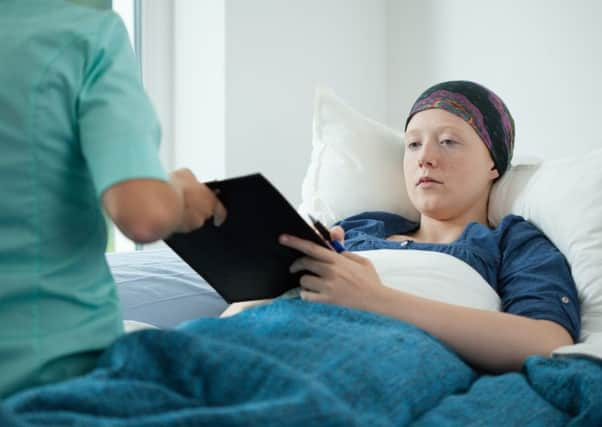Teenagers facing crisis of trust in cancer treatment


Young people have reported having to Google their diagnosis because they do not know what it is, or being told they have cancer over the phone without their parents present.
International experts will tell the world’s first Global Adolescent and Young Adult (AYA) Cancer Congress in Edinburgh this week that young people could miss out on treatment or fail to turn up for appointments if they do not trust medics.
Advertisement
Hide AdAdvertisement
Hide AdAnne Katz, a clinical nurse specialist and sexuality counsellor at Cancer Care Manitoba, in Canada, said some medics were worried about how to break difficult news to young people but this fear often led to late diagnosis and poor communication.
She said: “There are many conversations you have to have, particularly with young people that can sometimes be a little bit awkward for those of us who are a bit older.
“It’s about timing, it’s about empathy and finding the right time to explain things.
“Young people are invincible, immortal and unflappable, but they aren’t really.
“We need to take more time as trying to push all the information into a half hour can be a problem.”
More than 200 teenagers are diagnosed with cancer in Scotland every year, with many cases diagnosed late.
A third of young cancer patients are diagnosed in A&E because their health has deteriorated before the cancer is spotted, according to a recent survey by the Teenage Cancer Trust (TCT).
Katz said: “Sometimes their symptoms will have been diagnosed as something else so there is an inherent mistrust, as they feel they are not going to be believed.
Advertisement
Hide AdAdvertisement
Hide Ad“There’s an opportunity for mistrust and for somebody to not come back for treatment.”
Scotland has led the way by introducing the UK’s first dedicated cancer plan for teenagers and children last year, but campaigners say there is much more to be done.
Siobhan Dunn, TCT chief executive, said: “I have often heard of stories from young people like Phil [see case study] and their families who go to have bad news broken to them.
“Language is used like ‘malignant growths’ or ‘non-Hodgkin lymphoma’ which is confusing and often doesn’t even include the word cancer.
“We know that does happen, which is a desperate situation which needs to be recognised. We have particular concerns when this happens around the long-term problems for that family in trusting their consultant. Right off the bat that is a problem.”
The first Global Adolescent and Young Adult (AYA) Cancer Congress will be opened tomorrow by First Minister Nicola Sturgeon.
CASE STUDY
When 18-year-old Phil Higgins was diagnosed with acute lymphoblastic leukaemia (ALL) in November 2012, he had to Google the disease to find out what it meant.
He first noticed something was wrong when he started to feel light headed and tired while working as a picker at Amazon’s warehouse in Fife.
Advertisement
Hide AdAdvertisement
Hide AdHis GP first thought he might have anaemia but doctors at Victoria Hospital in Kirkcaldy soon realised his blood test results were worrying.
Phil, of Dunfermline, said: “I got told but I didn’t really know what it [ALL] was. I didn’t really show any reaction to it because I was confused about what the condition was.
“I started looking online but I didn’t know if anything I found was right.
“It wasn’t until I phoned my mum that it hit me. I burst into tears then. It was quite hard.”
Within days Phil started chemotherapy, which continued until May this year.
He only really began to understand his diagnosis after speaking to specialist nurses on the wards and through meeting other young people through support groups organised by the Teenage Cancer Trust
Phil, now 22, is back at college studying games animation but he hopes to work in youth support so he can help others like himself.